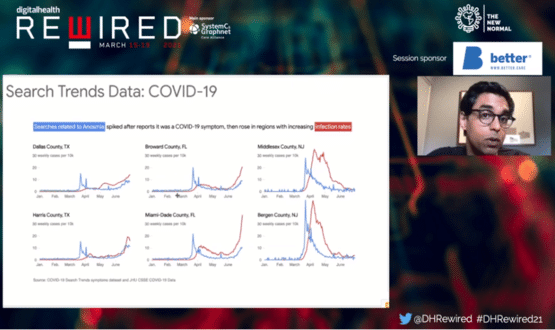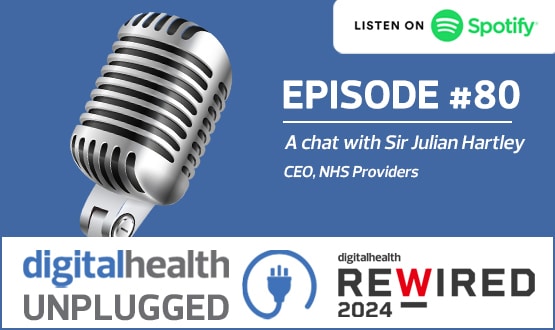Rewired 2021: Big tech as role to play in ‘turning the tide on pandemic’
- 19 March 2021

Big tech companies have a role to play in assisting scientists to “turn the tide against this pandemic”, a research lead at Google Health UK has said.
Speaking at Digital Health Rewired on 19 March, Dr Alan Karthikesalingam told the audience about the work Google had undertaken to help manage the pandemic explaining that big technology companies had become public health tools.
In the early stages of the pandemic, the global tech conglomerate began to collect datasets including information panels on Google search, symptom search datasets and community mobility reports. These datasets were then available to governments and researchers to help them map and respond to Covid-19.
“As a clinician who still practices in the NHS, I never really viewed Google as a public health tool before, but this past year has been an extraordinary and challenging time during which, like it or not, big technology companies have become an important tool for public health,” Karthikesalingam said during the New Normal Summit.
“A way big technology companies can help is in assisting scientists and researchers who are helping us turn the tide against this pandemic.
“On the one hand, by releasing trusted datasets that modellers and scientists around the world can use, and on the other hand helping in that exercise themselves by doing modelling and opensourcing and releasing those models so the scientific community can accelerate their efforts.”
But privacy must still remain paramount, he stressed.
“Releasing this kind of information has to be done with tremendous attention to privacy,” Karthikesalingam said.
In the future health datasets collected by big tech companies, not just relating to Covid-19 but relating to various conditions, will be used to improve care through developing machine learning in areas where medical expertise are “hard to triage”.
Misinformation
Karthikesalingam noted another area where technology companies have a role to play: tackling misinformation.
“I think the first place that large technology companies can play an important role is in combatting misinformation. The way we collectively behave outside of the acute sector is going to be incredibly important in our response to this, not just in the NHS but around the world,” he said.
At the start of the pandemic Google, along with other tech giants, formalised commitments to working with authoritative healthcare agencies and government around the world to provide accurate information. It’s a trend Karthikesalingam says is “here to stay”.
Noting Google’s Covid-19 ‘information panels’ that are available on multiple platforms online, in 70 languages in more than 200 countries, Karthikesalingam said tools like this “empower” patients to take the best action for their health.
‘Don’t exaggerate digital changes’
Earlier in the afternoon Chris Hopson, chief executive of NHS Providers, gave us a national view of the Covid-19 pandemic from the NHS provider perspective.
He said digital responses to coronavirus can be grouped into three main categories: ensuring care is safe for service users and staff; equipping the NHS workforce with the right tech to keep staff connected; and efficient use of resources to relieve “exceptional” pressure.
He said chief executives had told the organisation they had achieved several years worth of work within several months, but he warned we shouldn’t “exaggerate” digital changes.
Referring to a recent YouGov and Health Foundation survey that found most patients reported an increase in telephone consultations and bookings, Hopson said that’s “more like digital adoption than digital transformation”.
Echoing the comments of NHS Provider deputy CEO Saffron Cordery’s keynote on 15 March, Hopson said there had been digital adoption with “pace, purpose and priority”.
“There’s been a real significant change of attitudes here and that’s the most significant change,” he said.
“There’s a real sense that now digital is everybody’s business. Over the last year every trust leader, regardless of their background in digital, would have overseen or been involved in the rollout and implementation of digital solutions.”
The future
Hopson said there are four key things the NHS needs to secure a digital future: funding, ‘What does good look like’ guidance, protection of staff wellbeing, and better system working.
He added that going forward Integrated Care Systems will be a “particularly important” place to think about digital.




